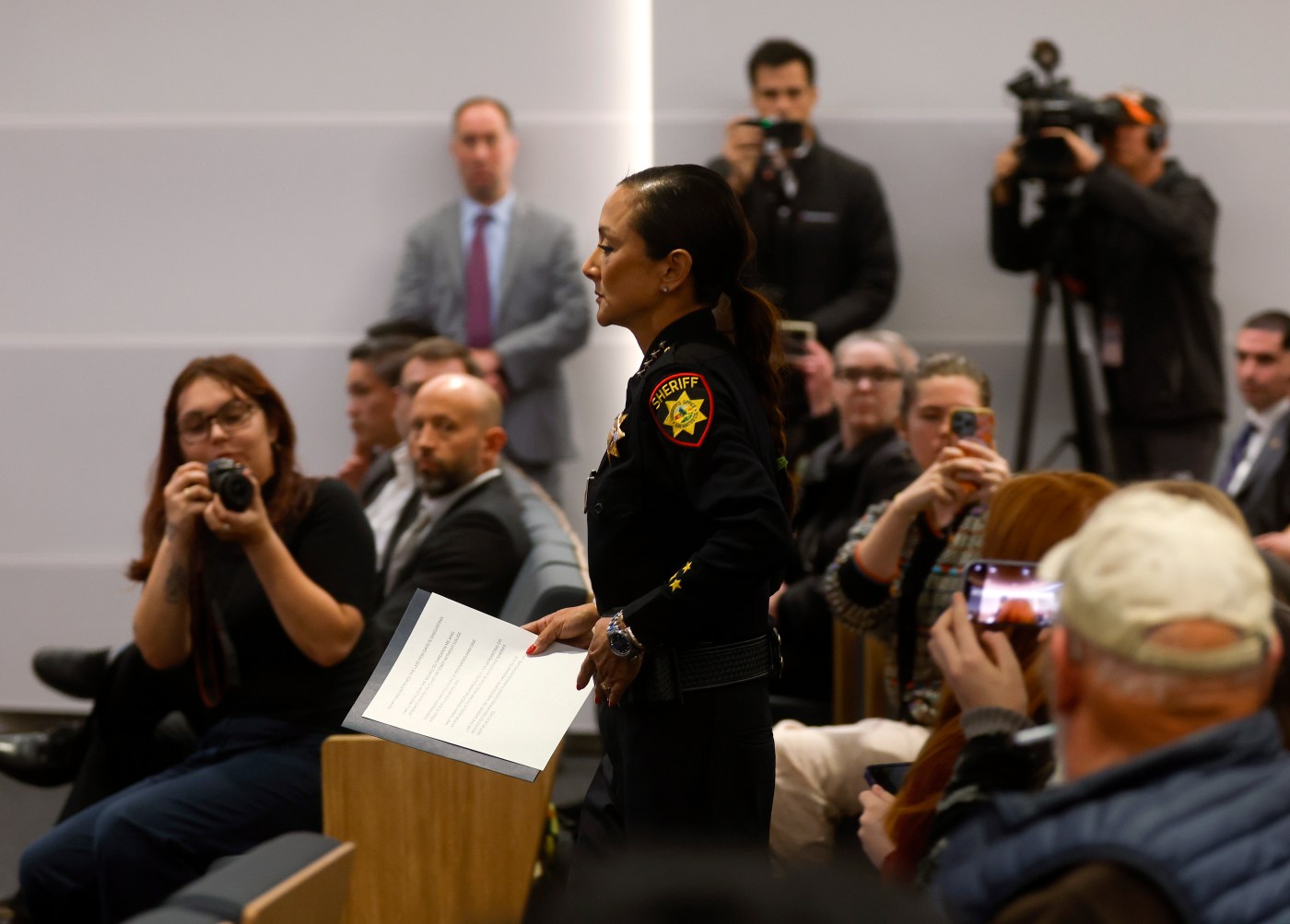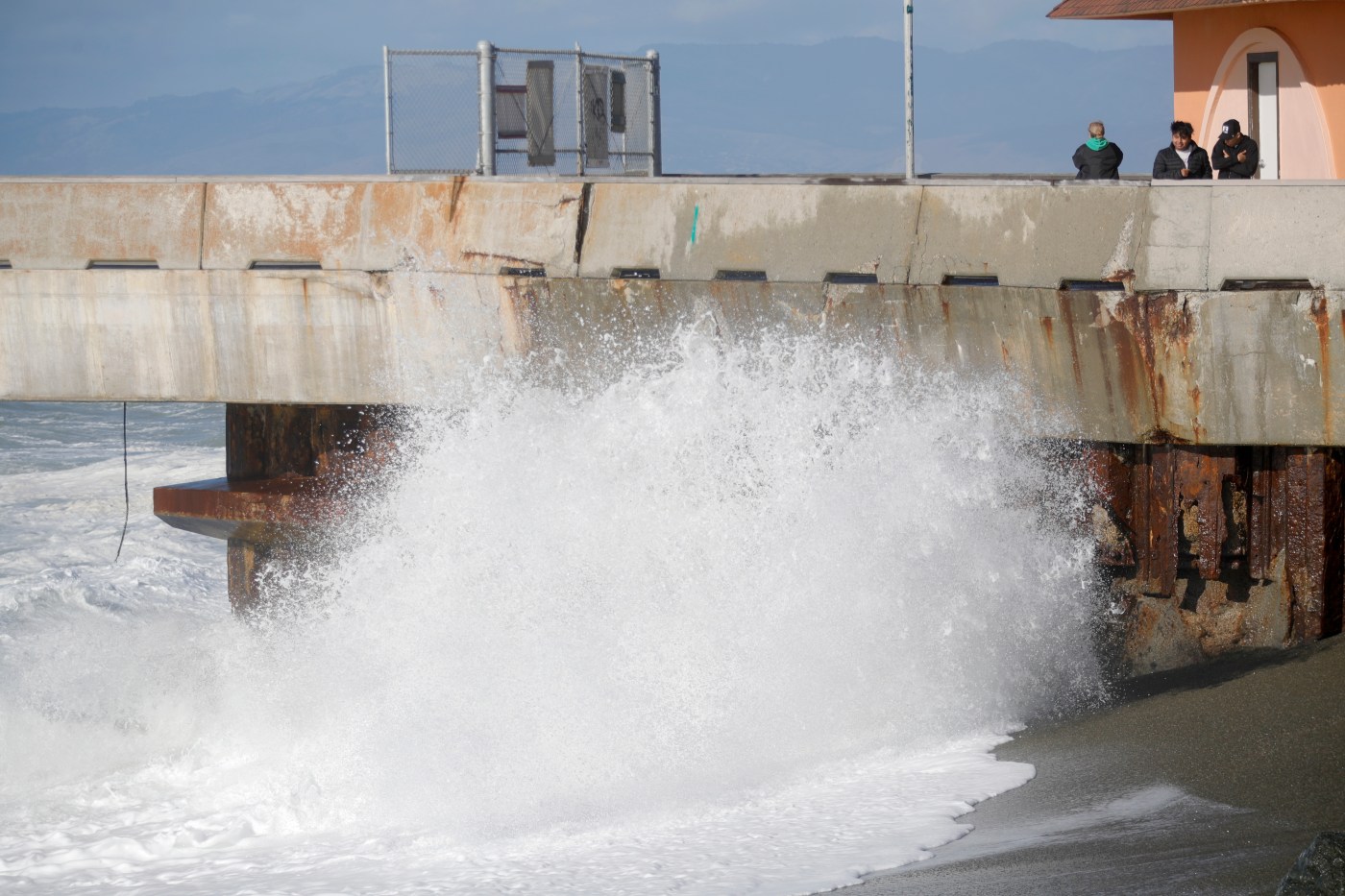Formal civil grand jury accusations of corruption and misconduct mark the latest escalation of efforts to remove San Mateo County Sheriff Christina Corpus from office.
The allegations announced Monday by the county’s District Attorney’s Office in a three-page filing includes one count of conflict of interest and three counts of retaliation.
The documents submitted to San Mateo County Superior Court do not yet reflect the civil grand jury’s full final report, which typically would run hundreds of pages. The full report also had not been released to the public as of Tuesday.
The formal accusation comes as Corpus faces a separate effort by the Board of Supervisors to remove her under a new authority voters approved in March — a power that applies only through the end of her current term in 2028.
While supervisors in counties such as Santa Clara, Contra Costa and Solano have clashed with their sheriffs in recent years, none have sought or obtained the power to remove one.
On the first count alleged in its filing, regarding a conflict of interest, the civil grand jury found sufficient evidence to accuse Corpus of having an inappropriate relationship with Victor Aenlle, her former chief of staff. It said she violated the county charter by using her position to hire, supervise, and repeatedly seek pay raises for Aenlle, with whom she reportedly had a close personal relationship that she did not disclose to the county.
Related Articles
Civil grand jury accuses San Mateo County sheriff of corruption, misconduct
Editorial: Removal of Sheriff Corpus rife with secrecy, lacks due process
San Mateo supervisors scrutinize sheriff’s department spending
San Mateo County supervisors vote to oust Sheriff Corpus from office
Hearing officer recommends removing San Mateo County sheriff
That finding echoes the conclusions of retired Judge LaDoris Cordell, whose more than 400-page report released last year detailed a pattern of alleged corruption and misconduct, including Corpus’ undisclosed relationship with Aenlle. Cordell’s findings prompted calls for Corpus’ resignation and the Board of Supervisors’ decision to pursue her removal through a special election.
Corpus later commissioned a rebuttal from former Riverside County Superior Court Judge Burke Strunsky, who criticized Cordell’s report for relying on anonymous sources and unrecorded interviews.
The first count in the grand jury’s accusation regarding retaliation concerns the sheriff’s firing of Assistant Sheriff Ryan Monaghan. According to the accusation, Monaghan was allegedly fired by Corpus for participating in Cordell’s investigation. The civil grand jury concluded Corpus committed “willful or corrupt misconduct” in violation of county ordinance and its labor code.
File photo of San Mateo County Sheriff Christina Corpus entering the San Mateo County Board of Supervisors special meeting in Redwood City in November of 2024. Formal civil grand jury accusations of corruption and misconduct mark the latest escalation of efforts to remove Corpus from office. (Nhat V. Meyer/Bay Area News Group)
The second retaliation count accuses Corpus of transferring Captain Brian Philip from the Professional Standards Bureau to the jail division after Philip refused to serve Deputy Sheriffs’ Association President Carlos Tapia with an internal affairs notice — an investigation notice for alleged wrongdoing — and declined to arrest Tapia in November 2024 for alleged timecard fraud. District Attorney Steve Wagstaffe later declined to file charges against Tapia.
The third such count claims Tapia’s arrest was in retaliation for his involvement in union activities. These activities include his participation in “heated” labor negotiations with Corpus, submitting a declaration to the labor board for public employees in support of a union complaint against Corpus, and publicly announcing a union “no confidence” vote against Aenlle late last year. The accusation does not specify the subject of the labor negotiations or what caused them to become “heated.”
Three other accusations were crossed out of the filing, suggesting the civil grand jury likely did not find sufficient evidence to support them. The allegations involved labor decisions, such as cutting overtime or reassigning staff, that appear to be linked to complaints about Aenlle or Corpus.
In an email to this news organization Monday, Corpus’ attorney, Thomas Mazzucco, dismissed the allegations as “politically motivated complaints by the upper echelons and union leadership” within the Sheriff’s Office.
“These complaints regarding assignments, command staff selections and union issues are not uncommon for large law enforcement agencies,” Mazzucco wrote in the email.
County spokesperson Effie Milionis Verducci told this news organization the Board of Supervisors will continue its separate removal proceedings, which have already cost the county at least $4 million for the special election — not including the cost of multiple investigations and consultants involved in the process.
If convicted through the civil grand jury process, Corpus could be removed from office.
According to a 2021 interview with William Larsen, a retired prosecutor and expert on the process, civil grand jury trials closely mirror criminal proceedings, involving jury selection, witness testimony and a finding of guilt or innocence. Fewer than 100 public officials have been removed this way in California in the past 150 years.
In 2022, then-Santa Clara County Sheriff Laurie Smith resigned nearly a year after a civil grand jury issued an accusation against her — and as the jury in her removal trial that soon after convicted her was deliberating. That case did not involve action by that county’s Board of Supervisors.
Corpus is scheduled to make her first appearance in San Mateo County Superior Court to answer the civil grand jury accusations on July 15 before Judge Stephanie Garratt.





